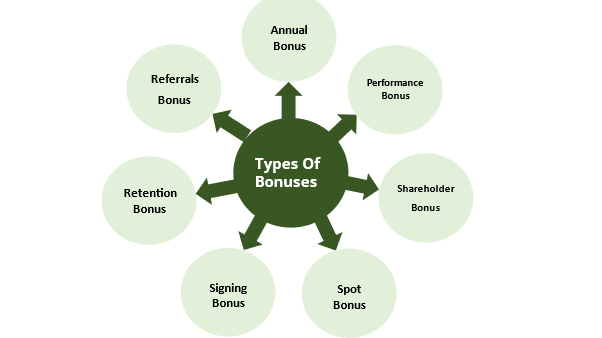What is a bonus?
A bonus is a monetary component given to an employee on top of his or her regular wage or salary depending on performance. Both top executives and entry-level staff may be eligible for bonuses. Traditionally, bonuses have been awarded to excellent employees, but companies have often provided bonuses to the entire firm to avoid jealousy among employees.
At times, all employees in a corporation have been given extra cash at a specific time of the year. A Christmas bonus, for example, is an additional payment given to staff at Christmas, while insurance firms give out a customer bonus after a very prosperous year.
Furthermore, a corporation may use bonuses to express gratitude to employees who attain longevity milestones or recognise achievements and lure new employees to join the ranks.
Summary
- Bonus pay is a cash payment to an employee in addition to his or her regular salary or wages.
- A corporation may give bonuses to reward good performance or an incentive.
- Employee bonuses can be awarded in a variety of methods, including stock and cash.

Source: © Cammeraydave | Megapixl.com
Frequently Asked Questions (FAQs)
Why do firms offer bonuses?
Businesses frequently offer bonuses in response to market demand. If companies of similar size, area, or industry give bonuses to their employees, a corporation may feel forced to follow suit to compete for top personnel. They also want to recruit someone they know will perform well in the company's success.

Source: © Hippylee | Megapixl.com
Bonuses appeal to employers because they motivate employees to work hard to help the firm prosper. Companies that understand they can make more money by increasing revenue, whether indirectly (via executive leadership or marketing) or directly (via sales), will be highly motivated to do so.
What are the many forms of bonuses?
Annual bonus
An annual bonus is usually dependent on the company's overall performance and can also be thought of as profit sharing. So, depending on how successful the organisation or a specific department was that year and how crucial an employee was to that accomplishment, an employee may receive a modest or huge bonus.
Companies wait until the end of the year to pay bonuses because it requires employees to stay on the job longer, so very few people leave their positions before receiving their annual bonus. On the other side, it's linked to company objectives, so they want to make sure they're driving performance for the entire year, not just a portion of it.
Bonuses for great performance
Performance bonuses are broader incentives that motivate the employees throughout the year and are usually tied to specific performance measures. Bonuses are frequently determined based on how far a department, an individual, or a team exceeds particular targets or goals.
Performance can be evaluated annually, quarterly, or monthly though incentives are typically given at the end of the calendar or fiscal year.
Bonuses for shareholders
Companies may offer bonuses to their shareholders as a means to boost their return on investment. The most frequent types of shareholder bonuses are bonus shares and dividends.
Spot bonus
A spot bonus is given to employees who go above and beyond the time and effort required to complete a task that was not part of their job description. Suppose an employee, for example, contributed unexpectedly to the firm's success or assisted with a specific project by working beyond hours. In that case, the firm can use its discretion to pay some additional compensation.
Signing bonus
A signing bonus is a one-time payment offered to workers when they accept a new position or encourage candidates to take the job. Companies may offer it if an employee is leaving a better position or if the person is moving to a new place for work and the employer wants to cover part of the expenditures (this might also be in the form of a relocation bonus).
Bonus for retention
The purpose of a retention bonus is to keep valuable employees. It's usually paid out following a merger, acquisition, or large-scale reorganisation to persuade staff to stay on for a longer length of time if they have a better offer elsewhere or are considering leaving.
Bonus for referrals
A referral incentive is offered to current workers to motivate them to refer exceptional candidates for open positions at the organisation. It's usually not given until the candidate has been hired and has been with the company for a few months.

Source: Kalkine Image
What is the difference between a bonus and a commission?
Bonuses and commissions are terms used to describe payments provided by companies to employees in addition to their regular salary and wages.
On the other hand, bonuses are usually dependent on the performance of the company, whereas commissions are generally dependent on the performance of the employee.

Source: © Paulfleet | Megapixl.com
Bonuses are sometimes given to employees who perform well. Simply put, bonuses can be tied to either the Company's or the individual's success, but not commissions. Companies only pay out commissions when employees contribute significantly to the company's success.
To put it another way, the phrase "bonus" can refer to "commission," but "commission" never refers to "bonus" when referring to a company's performance.
 Please wait processing your request...
Please wait processing your request...